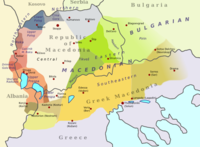Solun-Voden dialect
This article should specify the language of its non-English content, using {{lang}}, {{transliteration}} for transliterated languages, and {{IPA}} for phonetic transcriptions, with an appropriate ISO 639 code. Wikipedia's multilingual support templates may also be used. (April 2020) |
Republic of North Macedonia

The Solun-Voden dialect, dialectology.
Dialect area
The dialect is named after
Republic of North Macedonia.[5]
In terms of Bulgarian dialectology,
Suho-Visoka sub-dialect
The Suho-Visoka sub-dialect is spoken in and around the city of
Nikopoli (Зарово, Zarovo), Xylopoli (Негован, Negovan), Levchohori (Клепе, Klepe), Klisali (Клисали, Klisali) and Assiros (Гвоздово, Gvozdovo). The subdialect has been referred to as Bogdanski Govor (Macedonian
: Богдански говор), in reference to its position on the "Bogdan" mountain.
One of the first researchers of the
Slovenian linguist Vatroslav Oblak described the historical development of the Bulgarian phonology and morphology, based mainly on the dialect of Suho and the adjoining area. He noted that the villages Suho, Zarovo and Visoka formed a center of nasalization.[8]
Phonological characteristics
- Retention of nasal vowels (Solun dialect in the region north-east of Solun): rə ̃ka[9](mk:raka, bg:rəka), skɤ ̃p (mk:skap, bg:skɤp), pɛ ̃tuk (mk:pɛtok, bg:pɛtək), tʃɛ ̃du (bg, mk:tʃɛdo).
- Retention of vowels ѫ: vəʒa (bg:vəʒɛ), vətuk (bg:vətɤk), gɤska (bg:gɤska), dəɡa (bg:dəga), zəbi (bg:zəbi), mɤka (bg:mɤka), mɤʃ (bg:mɤʒ), pɤrt (bg:prɤt), pɤt (bg:pɤt), prɤtʃki (bg:prɤtʃki), sɤbuta (bg:sɤbɔta), ɡəsɔk (bg:ɡəsɔk), ɡəsɛnitsa (bg:ɡəsɛnitsa), mɤtɛnitsa (bg:mɤtɛnitsa). Less often the vowel uoccurs instead of ɤ: kuca (bg:kɤʃta, mk:kuca), kusa (bg:kɤsa), pupka (bg:pɤpka).
- Vowel ъ: bɔtʃva (bg:bɤtʃva), vɔpka, vɔʃka (bg:vɤʃka), dɔʃ (bg:dɤʒd), zɔlva (bg:zɤlva), sɔn (bg:sɤn), takɔf (bg:takɤv), vətɔk (bg:vətɤk), vɔsɔk (bg:vɔsək)(but also: vətuk, vɔsuk).
- A very important characteristic is the reduction of the wide (unstressed) vowels. This occurs most often in the middle or the beginning of words: ɔ reduces to u — udinitsa (bg:vɔdɛnitsa), mutuvilka (bg:mɔtɔvilka), tutʃilo (bg:tɔtʃilo), usnɔva (bg:ɔsnɔva), uftʃar (bg:ɔvtʃar), usten (bg:ɔsten), utset (bg:ɔtset); ɛ reduces to i — zilɛn, pitɛl, nɛbitɔ, dɛvir, ʒɛnin, molits; a reduces to ə — pəzartʃin, pəspal, kɔmər, kɔkəl, tʃɤrgəta, mandrəta. In some morphological categories this reduction develops further into absorption of the unstressed wide vowels: ɔktɔ (bg:ɔkɔtɔ), litstɔ (bg:litsɛtɔ), duvitsta (bg:vdɔvitsata), grədinta (bg:gradinata), tuvarmɛ (bg:tɔvarimɛ), tuvartɛ (bg:tɔvaritɛ), katʃmɛ (bg:katʃimɛ).
- Generally, the consonant x is retained: in the end of words — vlax, grax, urɛx, strax, sux, vərnax, kəʒax, nusix; in the middle of words — muxlɛsinu, təxtəbita, boxtʃa, sɛdɛxa, bixa, tərtʃaxa. However, in the beginning of words /x/ is often omitted: arnɔ, arman, iʎada, itʃ, ɔrɔ, lɛp.
- The palatals ɟ, jɟ predominate over the Old Church Slavonic consonant clusters ʃt and ʒd : nɔc, cɛrka, prifacum, nejcum, lɛjca (mk:lɛca, bg:lɛʃta), sfɛjca (mk:svɛca, bg:svɛʃt), plajcaʃɛ (mk: placaʃɛ, bg:plaʃtaʃɛ); vɛɟi (mk:vɛɟi, bg:vɛʒdi), mɛɟa, saɟa, miɟu, mɛjɟa, sajɟi. In some cases, however, the diphthongs ʃt, ʒd are retained: gaʃti, lɛʃta, guvɛʒdo, prɛʒda.
- Relatively unpredictable stress. Often the stress is on the penult, but there are words which have stress placed on different syllables.[10]
Morphological characteristics
- Definite article -ut, -u for masculine gender: vratut, dɛput, zɛtut, sɔnut, sinut, krumidut, nərodut, ubrazut; ɔginu, guʃtəru, vɛtɛru.
- Definite article -to for plural: bugərɛto, kamənɛto, tsigajnɛto, vulɔvɛto, kojnɛto.
- A single common suffix -um for all three verb present tense conjugations: ɔrum, tsɛpum, pasum, vikum, glɛdum, brɔjum.
- Suffix -m for 1st person singular present tense: pijum, stojum, jadum, ɔdum.
Other specific characteristics
- Enclitic at the beginning of the sentence: Mu gɔ klava petʃatut. Si ja goreʃe furnata.
- Single short form mu for masculine, neutral, feminine, and plural pronouns: Na baba ce mu nɔsum da jədɛ (I'll take something for my grandma to eat). Na starite mu ɛ mɤtʃnɔ (It is hard for old people). Na nih mu davum jadɛjne (I give it/him/them a meal).
- Use of the preposition u instead of the preposition vo :vo selo → u selo (in village)
- Use of the preposition ut instead of ot : ut Solun → od Solun (from/of Solun). This is because ɔ in ɔt when combined with the next word becomes a wide (unstressed) vowel which undergoes reduction (see Phonological characteristics).
Comparison of the Solun-Voden dialect with Standard Bulgarian and Standard Macedonian
| |||||||||||||||||||||||||||||||||||||||||||||||||||||||||||||||||||||||||||||||||||||||||||
|---|---|---|---|---|---|---|---|---|---|---|---|---|---|---|---|---|---|---|---|---|---|---|---|---|---|---|---|---|---|---|---|---|---|---|---|---|---|---|---|---|---|---|---|---|---|---|---|---|---|---|---|---|---|---|---|---|---|---|---|---|---|---|---|---|---|---|---|---|---|---|---|---|---|---|---|---|---|---|---|---|---|---|---|---|---|---|---|---|---|---|---|
|
Typical Words
- ʒarba (bg,mk:ʒaba) - frog
- ʃarino (bg,mk:ʃareno) - coloured
- kutʃja (bg,mk:kutʃɛ) - dog
- kɤʃta (bg:kɤʃta, mk:kuќa) - house
- druguʃ (bg:drug pɤt, mk:drug pat) - another time
- vɔpka
References
- ^ [author missing] Фонолошкиот и прозодискиот систем на говорот на селото Негован (Солунско). ПрилОЛЛН, МАНУ, 1991, XVI, 2, стр. 15-32.
- ^ Romanski, St. Долновардарският говор. — Мак. преглед, 1932, № 1, 99—140
- ^ OCLC 53429452.
- ^ Božidar Vidoeski, Фонолошкиот систем на говорот на селото Чеган (Воденско): инвентар на фонолошките единици. МЈ, 1978, XXIX, стр. 61-73.
- ^ OCLC 888018507.
- ^ [author missing]. Акцентските системи во македонските дијалекти во Грција (Еѓејска Македонија) и Јужна Албанија. МЈ, 1985-1986, XXXVI-XXXVII, стр. 19-45.
- ^ Mladenov, Stefan. Geschichte der bulgarischen Sprache, Berlin-Leipzig, 1929, § 209.
- ^ Облакъ, Ватрославъ (1894). "Приносъ къмъ българската граматика" (PDF). Сборникъ за народни умотворения, наука и книжнина. XI: 517–519. Retrieved 2016-08-05.
- ISBN 0-521-63751-1. Retrieved 2008-10-24.
- ^ Шклифов, Благой и Екатерина Шклифова, Български диалектни текстове от Егейска Македония, София 2003, с. 18 (Shklifov, Blagoy and Ekaterina Shklifova. Bulgarian dialect texts from Aegean Macedonia Sofia 2003, p. 18)


